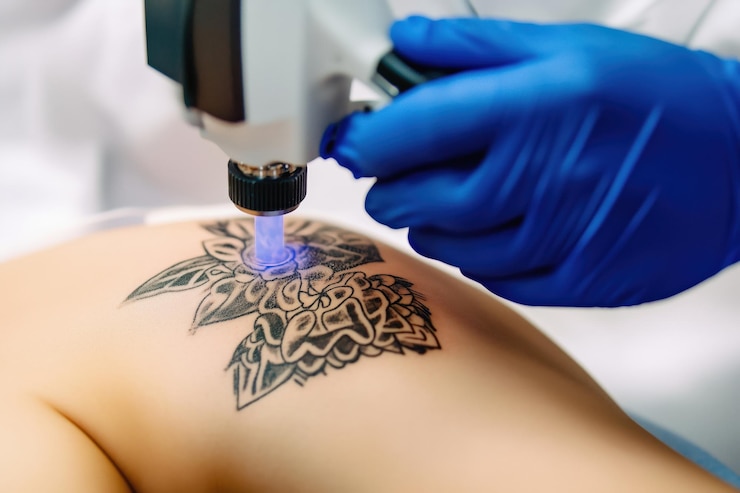Deciding to remove a tattoo is a significant decision that can affect your appearance and emotional well-being. With advances in laser technology, tattoo removal has become a viable option for many people. However, it's essential to determine whether Laser Tattoo Removal In Dubai is the right choice for you. This guide will help you evaluate your situation, understand the process, and make an informed decision.
1. Understanding Laser Tattoo Removal
How It Works
Laser tattoo removal uses specific wavelengths of light to target and break down ink particles embedded in the skin. The body’s immune system then gradually removes these fragmented ink particles over time. The effectiveness of this method depends on several factors, including the tattoo’s color, size, and location.
Types of Lasers Used
There are primarily two types of lasers used in tattoo removal:
- Q-Switched Lasers: These are the most common lasers used for tattoo removal. They emit short bursts of high-intensity light to break down ink particles. Different Q-switched lasers target various ink colors effectively.
- Pico Lasers: A newer technology, pico lasers deliver ultra-short pulses of energy, allowing for even more effective ink fragmentation with less discomfort. They can be particularly advantageous for colorful tattoos.

2. Assessing Your Tattoo
Tattoo Characteristics
Before deciding on laser tattoo removal, consider the following characteristics of your tattoo:
- Color: Darker colors like black and blue are typically easier to remove than lighter colors such as yellow and green.
- Size: Larger tattoos may require more sessions for complete removal, whereas smaller tattoos can often be treated more quickly.
- Age: Older tattoos may fade more easily compared to newer ones, which tend to have more saturated ink.
Location on the Body
The location of the tattoo can influence the effectiveness of the removal process. Tattoos on areas with better blood circulation may respond more effectively to treatment, while those on the extremities (like hands or feet) may take longer to heal.
3. Evaluating Your Health
Medical History
Your overall health and medical history play a crucial role in determining if you’re a suitable candidate for laser tattoo removal. Here are some health considerations:
- Skin Conditions: If you have a history of skin conditions, such as eczema or psoriasis, consult a dermatologist to assess how laser treatment may affect your skin.
- Medication: Certain medications can increase sensitivity to light or affect healing. Be sure to discuss any medications you’re taking with your practitioner.
- Allergies: If you have allergies, particularly to topical anesthetics or antiseptics, it's important to inform your practitioner ahead of time.
Emotional Readiness
Removing a tattoo can evoke a range of emotions, especially if the tattoo holds personal significance. Consider whether you are emotionally prepared for the process and the potential changes in your appearance.
4. Understanding Your Expectations
Realistic Goals
Setting realistic expectations for the outcome of laser tattoo removal is essential. Complete removal may not always be possible, especially with certain colors or deeper inks. Understand that while many tattoos can fade significantly or become less visible, some may require multiple sessions to achieve your desired result.
Session Requirements
Discuss with your practitioner how many sessions you might need based on your tattoo’s characteristics. Treatments are generally spaced several weeks apart to allow the skin to heal and the immune system to clear out the ink.
5. Potential Risks and Side Effects
Understanding Risks
Like any medical procedure, laser tattoo removal comes with potential risks and side effects. Be sure to discuss these with your practitioner:
- Skin Irritation: Temporary redness, swelling, or blistering can occur after treatment.
- Hypopigmentation or Hyperpigmentation: Some patients may experience changes in skin color, especially those with darker skin tones.
- Scarring: While rare, scarring is a possibility, particularly if proper aftercare is not followed.
6. Financial Considerations
Cost of Treatment
The cost of laser tattoo removal can vary widely based on factors such as the tattoo's size, color, and the number of sessions needed. Evaluate whether the financial investment aligns with your goals and budget.
Insurance Coverage
Most insurance plans do not cover laser tattoo removal, as it is typically considered a cosmetic procedure. Check with your insurance provider to understand your coverage options.
7. Conclusion
Laser tattoo removal can be a highly effective method for removing unwanted tattoos, but it's not right for everyone. Assessing your tattoo's characteristics, your overall health, emotional readiness, expectations, and financial considerations will help you make an informed decision.
Consult with a qualified practitioner who can evaluate your unique situation and provide personalized recommendations. By taking the time to consider these factors, you can make a decision that aligns with your goals and ensures the best possible outcome for your tattoo removal journey.





Comments